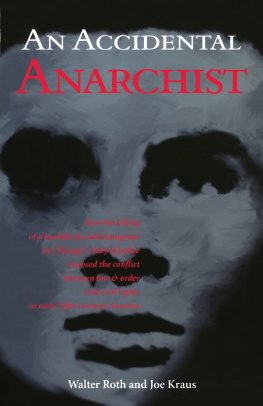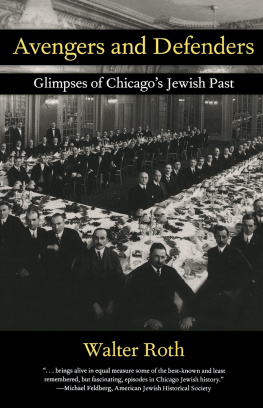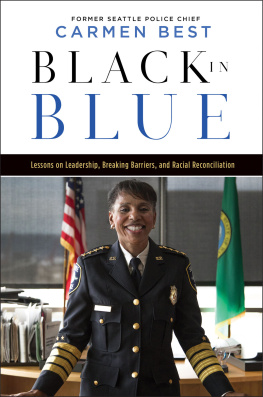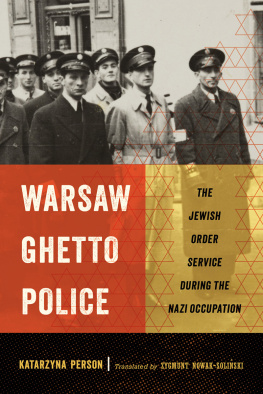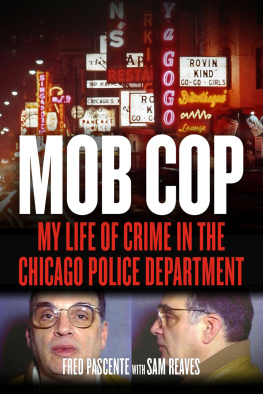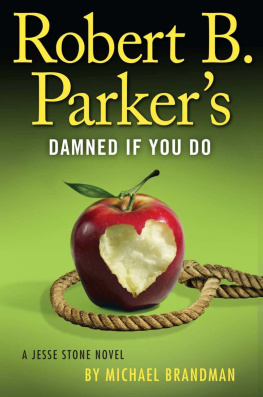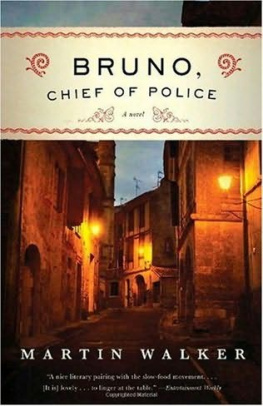
1998 by Rudi Publishing
A LL R IGHTS R ESERVED
Rudi Publishing
12 Geary St. #508
San Francisco, CA 94108
(415)392-6940
ISBN 0-945213-23-9 (paper)
ISBN 0-897335-02-3 (hardcover)
Printed in the United States of America
Vaughan Printing, Nashville, Tennessee
Library of Congress Cataloging-in-Publication Data
Roth, Walter,
An accidental anarchist: how the killing of a humble Jewish immigrant by Chicagos chief of police exposed the conflict between law & order and civil rights in early 20th-century America / Walter Roth and Joe Kraus.
p. cm.
Includes bibliographical references and index.
ISBN 0-945213-24-7 (hardcover). ISBN 0-945213-23-9 (paper)
1. MurderIllinoisChicago. 2. ImmigrantsIllinoisChicago. 3. Averbuch, Lazarus, d. 1908. 4. Chicago (Ill.)History18755. Chicago (Ill.)Social conditions. I. Kraus, Joe. II. Title.
HV6534.C4R67 1997
977.311041dc21
97-52551
CIP
Cover design by Kristin Boekhoff
C ONTENTS
| Index |
| Index of Newspapers and Magazines |
A CKNOWLEDGMENTS
W e owe thanks to many people in helping us put this book together. We thank our familiesWalters wife Chaya and their children Ari and Kate; Judy and Steven; and Mark and Miriam (who spent a summer helping with the research for this book); Richard, June, Edward, and Amy Kraus; and Paula Chaikenfor their understanding and patience as we fought with each other every step of the way. We thank Charles Bernstein, Irwin Suloway, and Norman Schwartz of the Chicago Jewish Historical Society for their help and encouragement; Joseph Andy Hays for his assistance; and Alex Bogdanovitch, Bill Huston, and Ray Marx for their support. We also thank Terri Boekhoff and the people of Rudi PublishingMichael Huston, Kristin Boekhoff, Brien Woods, and David Featherstonefor their belief in this project and their many efforts to strengthen our manuscript. Finally, we acknowledge the invaluable assistance of Dr. Zanville Klein for his Yiddish translations, and we hope that this book can serve as a testament to his memory.
P REFACE
T he story of the Averbuch Affairthe story of the little we know about a young man named either Lazarus or Jeremiah Averbuchhas a hole in its middle. We know a great deal about what took place around the killing of the young Russian Jewish immigrant in 1908, but we know almost nothing about the event itself. This is a murder mystery, but who intended to kill whom and for what motive remain unanswerable questions. We know that Averbuch wound up dead and we know that George Shippy admitted firing the fatal bullets, but that is almost all we know about the central moment of the affair. We dont know what brought Averbuch to a place as far from his own world as Shippys home. We dont know what Shippy thought as he saw a foreign-looking man on his doorstep. And, in the end, we dont know who Averbuch really was.
We set out to recount the story of Averbuchs killing with two competing impulses in mind. First, we approached it as a mystery that has never received due attention. We tried to present all Many of the individuals caught up in the affairincluding Jane Addams, Emma Goldman, Ben Reitman, Harold Ickes, Oscar Straus, Bernard Horwich, and Philip Bregstonewrote about it in their memoirs or left observations of it that their biographers picked up, but we are not aware of any work that pulls together as wide a range of material on the affair as we attempt to do.
Our second impulse was to trace the way the story of Averbuch was contested in the American public of 1908. To the Chicago represented by Fred Busse and George Shippy, immigrants were often foreign, different, and frightening. To the immigrant community that housed Olga Averbuch, the America outside its boundaries often seemed alien and threatening; in the case of Averbuch himself, it proved fatal. At the heart of the Averbuch Affair is a collision of those two very different communities. As newspaper reporters, social critics, political activists, government officials, and Americanized Jews told and retold the story of what happened when Averbuch went to Shippys home, they spoke at the same time of their hopes for what Chicagoindeed what all of Americacould be. Even if we leave the murder mystery largely unsolved, we hope to have shown what was at stake for the different people of Chicago as the city tried to make sense of a senseless affair.
In researching the case, we relied as much as possible on newspaper reports and the handful of other reports about the affair, drawing heavily from such mainstream newspapers as the Chicago Daily News, Chicago Evening American, Chicago Daily Journal, Chicago Record-Herald, Chicago Tribune, Inter Ocean (Chicago) and New York Times; from such parochial newspapers as the Chicago Daily Socialist and Yiddish newspapers such as the Daily Forward, Daily Courier (Chicago), and Morning Journal (New York); and from such contemporary magazines as The Public, The Reform Advocate, and Mother Earth. We attempted to situate the discussion about the affair within its historical moment by using other historical works, but our emphasis throughout was to record the story as its actors attempted to tell it. At times we quoted liberally from our sources in an effort to let the voices of 1908 reenact their fight to control the story of Averbuch and Shippy. We hope such lengthy quotations do not distract from either our analysis or the drama that played itself out as the period before the final inquest drew to a close. We hope, rather, that those voices, with all of their passions and fears, will help bring alive the fact that more than justice for Averbuch was at stake; the hole in the middle of the Averbuch Affair was the question of not merely what happened to the young man, but also of who could be an American in the Chicago of 1908.
Walter Roth and Joe Kraus
July, 1997
I
Two C ITIES C ALLED C HICAGO
March 2, 1908
C hicago started the twentieth century as two different cities. There was the Chicago that had flowered in the wake of the great fire in 1871. Its citizens were the prosperous merchants, bankers, industrialists, and politicians who had shaped the business district and fashionable lakeshore neighborhoods and who held unchallenged political power. They established most of Chicagos newspapers, bankrolled construction of the citys great buildings and industries, and laid out the basic blueprint that has directed Chicagos growth ever since. Most of them were born in the United States, and many had moved to Chicago from other parts of the country. They tried to make Chicago and its government in their imagea blend of East Coast dignity and Puritanism with a frontier consciousnessand, for a time perhaps, they succeeded.
The other Chicago was the city Carl Sandburg would celebrate. Its citizens were the many impoverished laborers and newly arrived immigrants who toiled in railroad depots, shipyards, and factories. Those thousands, added to by the relentless stream of immigrants, made up the bulk of the citys population. When fortunate, they lived in the less densely populated areas of the city. When less fortunate, they squeezed themselves into the ghettos and row houses of downtown and the west side of the Chicago River. Although their individual names are remembered less frequently than the gentrys, they too took part in shaping Chicago. They are the ones who eventually developed the many neighborhoods for which the city is known. They are the ones whose labor built the canals, roads, and buildings. And they are the ones who, through their unions and organizations, gave part of their image to the city: the tough, blue collar, big shouldered identity by which Chicago is still known.
Next page
